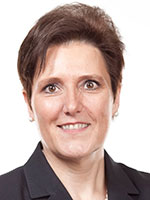Positive sentiment in Germany has been gaining momentum over the last year, and there is good reason to be optimistic. Treasury Today examines the economic forces driving the German economy’s growth, how it has positioned itself as a stable European country in an otherwise volatile region, and outlines the country’s suitability as a gateway for international businesses in search of expansion.


Gräfin Carola von Schmettow
CEO of HSBC Germany and Chair of the Management Board


Stephen Price
Head of Commercial Banking Germany (Member of the Management Board), HSBC Germany


Gabriele A. Schnell
Head of Payments and Cash Management, HSBC Germany

Key facts
Geography and society
- Population:
- 81 million (2014 estimate)
- Population growth rate:
- -0.18% (2014 estimate)
- Capital city:
- Berlin
- Time zone:
- CET
- Land boundaries:
- Austria, Belgium, Czech Republic, Denmark, France, Luxembourg, The Netherlands, Poland, Switzerland
- Coastline:
- 2,389km
Economy and business sector
- Currency:
- euro
- Financial capital:
- Frankfurt
- GDP annual growth:
- 0.1% (2013), 1.6% (2014)
- GDP per capita:
- $44,700 (2014 estimate)
- Ease of Doing Business rank:
- 14th (2015)
- Index of Economic Freedom:
- 16th (2015)
Politics
- Government type:
- federal republic
- President:
- Joachim Gauck
- Chancellor:
- Angela Merkel
Trading partners
- Top import partners:
- Netherlands, France, Belgium, China, Italy, UK, Austria, Russia, Poland, Switzerland, Czech Republic
- Top export destinations:
- France, Netherlands, US, Austria, China, Italy, Switzerland, Poland, Belgium
Country credit rating
Germany is the largest economy in Europe and the fourth largest by nominal GDP in the world. Although Germany’s economics ministry decreased the country’s growth forecasts slightly from 1.8% to 1.7% in October, the German economy shows solid growth. 2015 GDP growth forecasts of 1.6% from EY and 1.5% from HSBC research confirm the country’s stable upward trend and the return from a mid-2014 slump.
Lower oil prices, currency depreciation and a robust labour market have acted as a stimulus for better-than-expected domestic consumption. In fact, consumer confidence in the country sits near a 14-year high according to a poll this year by market research company, GfK. Whilst growth isn’t immune from risks such as the challenging market conditions in the single currency zone, analysts expect that the German economy will be propped up by strong consumer demand throughout the rest of the year and into 2016.
Maintaining good form
Although its advantages have been widely debated, the German economy is also benefiting from the European Central Bank’s (ECB) €1.1trn quantitative easing (QE) programme. In April this year – as QE pushed yields on German bonds with a maturity of as long as nine years below zero – the DAX Index closed at a record high.
In 2015, the country achieved its highest ever score from The Heritage Foundation Index of Economic Freedom, making its economy the 16th freest globally. Improvements cited by a corresponding report include marked advances in labour freedom and in policy areas related to market openness. These developments to economic freedom – openness to global trade, freedom from corruption and reliable business environments, for instance – are beneficial to overseas investors. “There is an open and welcoming foreign investment regime in Germany,” says Stephen Price, Country Head of Commercial Banking for HSBC Germany.
In addition, “Germany is in the centre and the heart of Europe. From here you can reach both the eastern and western parts of Europe quite easily,” explains Gabriele Schnell, Head of Payments and Cash Management for HSBC Germany. Its optimal location has traditionally led to Germany being leveraged as a hub for investments and trade logistics. Moreover, its infrastructure, according to Schnell, is “well-developed” and received recognition in IMB World Competitiveness Yearbook 2015, ranking ninth globally.
International presence
As such, it is unsurprising that Germany is a major export country. In fact, as Carola von Schmettow, CEO of HSBC Germany, explains, “Germany is one of the top export nations in the world.” However, she continues, “Germany is highly dependent on the global trade environment.” Given that the pace of trade is slowing somewhat globally, how has the country kept its position as a leading exporter?
Deutsche Bundesbank, Germany’s central bank, reported in December 2014 that, as the economy remains in remarkably good shape, German corporates are able to seize opportunities in foreign markets. The country’s Mittelstand (mid-market segment) has looked towards faster growing markets, where average growth rates far exceed those of the Eurozone, explains von Schmettow. For instance, China is now one of the country’s biggest trading partners and Asia is predicted to be Germany’s fastest growing export market over the next 15 years.
Closer to home, almost two thirds of German exports are within Europe. Harmonised standards and guidelines within the EU, free trade and the single currency within the Eurozone are some reasons for this. “The implementation of SEPA – unifying domestic and foreign bank transfers technically and regulatory – has been a major step in the direction of standardisation,” says Schnell. There are no longer restrictions to intra-European payments. What this means is that “one account, for instance in Germany, could be sufficient to settle your transactions across multiple euro countries,” says Schnell. For corporates, the possibility this allows to centralise payment processes is even more attractive than before because of increased transparency and reduced complexity and costs. In addition, the execution time of one working day enables a day-specific scheduling of transactions.
Attraction for multinationals
Germany is also an attractive prospect for foreign corporates looking to expand into Europe. Germany Trade & Invest (GTAI), the economic development agency of the Federal Republic of Germany, reported in April that Germany attracted a record €3.2bn in foreign investment in 2014. The number of new investors reached an all-time high and the number of new projects in Germany rose by a fifth as well as the value of projects. The largest green field investor was China, followed by the US. According to Robert Marsh, Group Treasurer for Matthews International Corporation, a provider of brand solutions and industrial automation solutions, with its headquarters in Pittsburgh, Pennsylvania and several subsidiaries in Germany: “Germany is a gateway to Europe suitable for our international strategy.”
“There is a strong interest in the technological expertise and the research capabilities in Germany as well as the infrastructure and generally reliable, transparent processes,” explains HSBC’s Schnell. All of which, she notes, is appealing to an increasing number of foreign corporates. And, by choosing Germany, overseas corporates are offered “a highly developed legal and political framework that provides a good deal of security,” says Price. The country is arguably a representation of stability in an otherwise volatile environment. Not only does it offer a resilient economy that represents relatively low risk with low inflation and low unemployment, from a workforce point of view, Price adds that Germany’s working population is highly trained, well-educated and committed to IT developments.
Case study
Top tips from Matthews International Corporation
Robert Marsh
Group Treasurer

Markus Pennekamp
EMEA Director of Finance

Matthews International Corporation, headquartered in Pittsburgh, Pennsylvania, USA since 1850, is a provider of brand solutions, memorialisation products and industrial automation solutions. Matthews, with more than 10,000 employees, has a presence in over 100 locations in more than 25 countries around the world. Matthews conducts business in Germany under a variety of trade names, including Saueressig, Schawk, IDL Worldwide, Anthem, Brandimage, Caggiati and Matthews Automation Solutions.
Robert Marsh, Treasurer, and Markus Pennekamp, EMEA Director of Finance, explain why Germany is an important market for Matthews and give their top tips for doing business in Germany:
- Germany represents a core component of our international strategy, serving as our company’s gateway to Europe. We have been doing business in Germany for more than 15 years and it has developed into one of our key European markets. When assessing opportunities globally, we identified several strong German-based businesses that shared our markets and corporate culture, representing good investments to expand the reach of Matthews.
- Germany offers an excellent combination of a strong domestic market and an outstanding infrastructure. In addition, Germany has a strong talent pool with reach across Europe which contributes to further strengthening our international strategy and enhancing our growth.
- Germany is a cooperative jurisdiction to operate from for a US-based business perspective. Although local regulations and laws differ from those in the US, support from the German Chambers of Commerce and public authorities is easily accessible, providing invaluable assistance to foreign companies such as ours in navigating applicable local requirements.
- Germany is fully integrated in the Eurozone, creating a number of possibilities for future shared service and treasury centralisation.
- Finally, the German market is currently very favourable for providing working capital and longer-term financing solutions including capital market instruments. Matthews have only just begun to investigate these opportunities, but the current low interest rate environment creates a variety of possibilities for attractive local funding (Schuldscheindarlehen – German Private Placement, for instance).
Legal considerations
For any business entity wanting to conduct operations in the country, decisions will need to be made under which form they want to do business. Generally, foreign investors will function through a subsidiary or branch – that is, an overseas company can set up a German branch as a place of business without necessarily forming a subsidiary. The registration of a foreign company branch must be made with the commercial register at the given location of that branch; application content will vary depending on the legal form of the overseas company. But, in general, registration must include: approvals by the German state (if required), the company’s foreign legal registration, the legal form of the company, persons with power of agency and applicable laws.
Should a foreign investor wish to set up a separate subsidiary, many investors decide to establish a limited liability company (GmbHs – ‘Gesellschaften mit beschränkter Haftung’). For the foundation of a GmbH the investor would have to (among other things) adopt articles of association in notarised form and file the company with the commercial register. Since the shareholders of a GmbH can control and instruct the management directly (which the shareholders of a public limited liability company – AG ‘Aktiengesellschaft’ cannot), foreign investors generally prefer to establish a subsidiary in the form of a GmbH.
Banking sector
Although there has been significant consolidation in Germany’s banking sector over the past decade, there are still a high number of banks operating in the country, including 168 domestic commercial banks, 36 foreign-owned banks and 109 foreign bank branches. As expected, these include most of the large international cash management banks, which offer full services. “It is a very competitive market and to that extent banks have to be very innovative in the payments and cash management space,” says Schnell.
Moreover, funding conditions are favourable, despite German banks having to contend with a number of measures the ECB has put in place. Compelled by the recent phase of stress testing in autumn 2014, banks have had to readjust their balance sheets to meet capital ratios set by regulations. All 24 German banks that took part completed the tests successfully.
Elsewhere, the new bank tax introduced in January 2011 by the German government expects banks to inject up to €1.2bn every year into a reserve fund to finance any future bank bailouts. This all points to a stable banking sector that is doing all it can to safeguard against external shocks.
Apart from the ECB, bank supervision in Germany is carried out by the German Financial Supervisory Authority – known as BaFin – and the central bank, Deutsche Bundesbank, in accordance with the Banking Act. The Bundesbank is a member of the European System of Central Banks (ESCB).
Payment instruments
-
Cheques.
Cheques are declining in use in Germany due to the preference for electronic payments for both high-value and low-value transactions.
-
Payment cards.
All payment cards issued in Germany are SEPA-compliant.
-
Cash.
Cash is still popular in Germany. In fact, the country remains one of the most cash-intensive advanced economies globally.
-
Direct debits.
Direct debits are available and typically used for low-value recurring payments. In February 2014, SEPA direct debits were introduced to replace Germany’s pre-authorised direct debit scheme until February 2016.
-
Credit transfers.
Although credit transfers can be paper-based or automated, all paper-based ones are truncated into electronic items. They are used for both high-value corporate and low-value retail payment transactions.
-
Electronic banking.
Electronic banking is commonplace – all of the country’s leading banks offer e-banking solutions.
Support for international companies
Against this backdrop, how can corporates successfully establish operations in the country? Choosing a banking partner with global reach and local knowledge is a good starting point, says Price. For instance, HSBC offers a team of specialised and dedicated members from their International Subsidiary Banking (ISB) team. These relationship bankers are experienced in facilitating market entry and providing guidance to international companies. They can provide corporates with “direct on-the-ground support in key markets,” explains Price. “Entering a new geography is often a challenging and, at times, a worrying occupation for corporates.” But, considering the international footprint of HSBC, the bank is well positioned to support companies in overcoming cultural issues and issues of communication and connectivity as well as the day to day role of support with issues of funding and FX. “The ISB team ensures the required level of understanding of how to operate in Germany is consistently provided, minimising the chance of unforeseen surprises for the corporate,” continues Price.
This particular approach to relationship management offers foreign corporates ease of access into a country whose advantages include:
- Reliability
- Transparency and a
- Competitive edge
Place it on a strong footing and, as von Schmettow concludes, “make Germany the ideal starting point for multinationals wanting to do business in Europe.”
Case study
Top tips from Testo AG

Matthias Wehrle
Head of Accounting

Testo AG, headquartered in Lenzkirch in Germany’s Black Forest, is a world market leader in the field of portable and stationary measurement technology. Testo AG has a presence on every continent with 30 subsidiaries and more than 80 trade partners.
Matthias Wehrle, the company’s Head of Accounting gives his top tips for doing business in Germany – and some considerations for German-based corporates looking to Asia for expansion:
- As in most countries, you have different local regulations and laws. So, before you set up a business overseas, it is important to clarify your company’s needs and be aware of new business procedures. That said, setting up a successful enterprise in Germany is relatively straightforward.
- It is important, especially when considering Asian markets, to find a good banking partner who can inform you about local nuances and keep you updated on regulatory changes. The HSBC team in China keeps Testo AG up-to-date and is well-placed to help with the company’s liquidity needs at both a domestic and international level.
- For German corporates doing business in China, it is also essential to keep up-to-date with China’s State Administration of Foreign Exchange (SAFE). It is the most important regulatory department in China for corporates and is responsible for the management and monitoring of cross-border trade and FX. Corporates will need to ask about every regulation in every Chinese province separately, however.
- To keep up to date in Germany, Asian corporates can ask the International German Chamber of Commerce for the latest information, as well as relying on their chosen bank partner for regular updates.